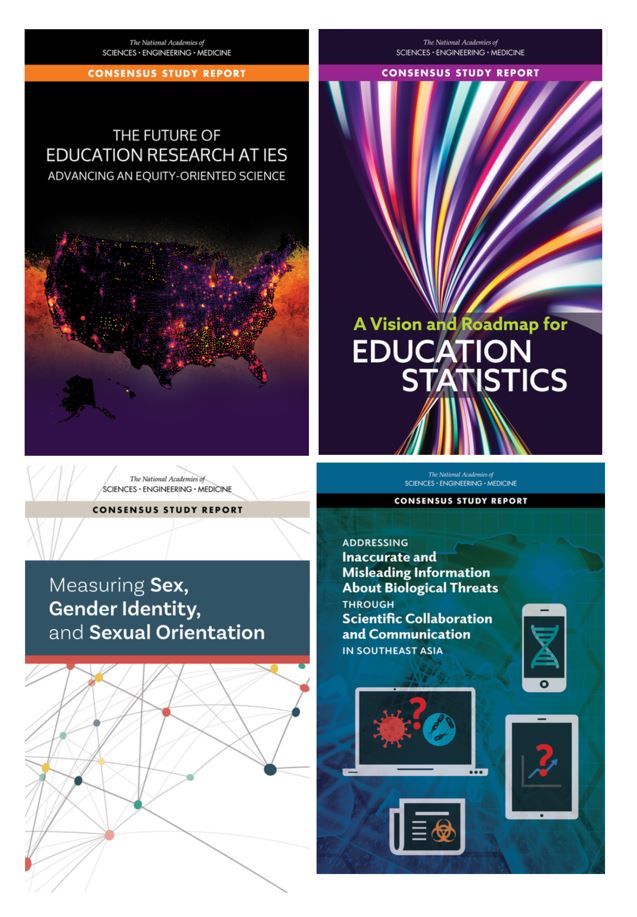
Measuring Sex, Gender Identity, and Sexual Orientation
This report from the Committee on National Statistics recommends that the National Institutes of Health (NIH) adopt new practices for collecting data on sex, gender, and sexual orientation – including collecting gender data by default, and not conflating gender with sex as a biological variable. The report points to a lack of consistency in language used in surveys and studies, complicating data analysis and reporting, and making it difficult to compare data across different programs and studies. In addition, the report offers principles for data collection, guidelines for collecting sex and gender data, and criteria for selecting recommended measures for sexual orientation identity. Better measurements will improve data quality, as well as the NIH’s ability to identify LGBTQI+ populations and understand the challenges they face.
Sponsor: National Institutes of Health
Download the Report | Report Highlights
The Future of Education Research at IES: Advancing an Equity-Oriented Science
This report from the Board on Science Education calls for the Institute of Education Sciences (IES) to update the structure and policies of research activities run by the National Center for Education Research (NCER) and the National Center for Special Education Research (NCSER) to better meet changing priorities in education— including improving equity and the usefulness of research. The report also calls for IES to revise the structure of its competitive grant process so that it is more responsive to the needs of educators, learners, and communities. Additionally, the report recommends that IES implement a range of strategies to achieve greater diversity in the racial, ethnic, and institutional background of all training participants, such as by supporting early career mentoring or funding short-term research opportunities for undergraduate and graduate students.
Sponsor: U.S. Department of Education
Download the Report | Report Highlights
A Vision and Roadmap for Education Statistics
This report from the Committee on National Statistics provides strategic advice for the National Center for Education Statistics (NCES)—the nation’s premier statistical agency for collecting, analyzing, and disseminating statistics at all levels of education. The report reviews developments in using alternative data sources, considers recent trends and future priorities, and suggests changes to NCES's programs and operations, with a focus on NCES’s statistical programs. The report reimagines NCES as a leader in the 21st century education data ecosystem, where it can meet the growing demands for policy-relevant statistical analyses and data to more effectively and efficiently achieve its mission, especially in light of the Foundations for Evidence-Based Policymaking Act of 2018 and the 2021 Presidential Executive Order on advancing racial equity.
Sponsor: U.S. Department of Education
Download the Report | Report Highlights
Addressing Inaccurate and Misleading Information About Biological Threats Through Scientific Collaboration and Communication in Southeast Asia
This report explains how scientists can work collaboratively across scientific disciplines and sectors to identify and address inaccuracies that could fuel mis- and disinformation about outbreaks, epidemics, and pandemics. Although the study focused on a scientific network primarily in Southeast Asia, it is relevant to scientists in other parts of the world. A companion "how-to-guide", available in print and in digital form, outlines practical steps that scientists can take to assess mis- or disinformation, determine whether and how they should address it, and effectively communicate the corrective information they develop.
Sponsor: CRDF Global
Download the Report
Measurement and Analysis of Public Opinion: An Analytic Framework
This publication from the Board on Behavioral, Cognitive, and Sensory Sciences provides guidance to intelligence analysts on strategies for assessing public opinion. Intelligence analysts conduct analyses every day, using decades of propriety tradecraft techniques and an arsenal of clandestine information gathering sources, but the resources available are not unlimited. Open source public opinion tools can provide timely and relatively inexpensive methods of understanding fast-moving conditions, acting as a force multiplier to help policymakers have a truly all-source understanding of complex events. By providing analysts with the best practices in survey methodology and nonsurvey methods for gathering data on public opinion, they will be armed with a clearer sense of important shifts in attitudes, elections, and unrest.
Sponsor: The Intelligence Community
Download the Report